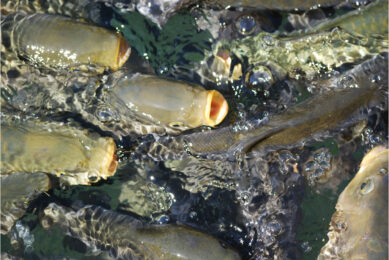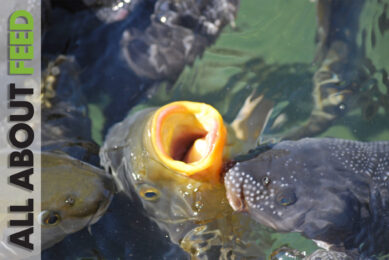Research: Phytase effect in rainbow trout feeds
Researchers at the Laval University in Quebec (Canada) studied the encapsulation of microbial phytase and its effects on phosphorus bioavailability in rainbow trout.
This study was undertaken to investigate the effects of adding microbial phytase to plant protein-based diets for rainbow trout (Oncorhynchus mykiss).
Trial setup
A plant protein-based basal diet was formulated to be isonitrogenous, isolipidic and isoenergetic to a nutrient-dense, fish meal-based control diet (Starter salmonid diet; Ontario Ministry of Natural Resources (MNR), University of Guelph).
The basal plant protein-based diet was supplemented with 3000 FTU microbial phytase/kg included either in a free form or encapsulated in chitosan-alginate microcapsules.
A second control group was fed the basal plant protein-based diet supplemented with monosodium phosphate to NRC requirements.
Apparent digestibility coefficients (ADC) were determined for dry matter, energy, protein, ash, P, Ca, Mg, Mn, Cu, Zn and Fe.
The above diets were fed to triplicate tanks of rainbow trout for 56 days; growth and feed efficiency were monitored at 2-week intervals. At the start of the study and at 28-day intervals, fish were sampled to determine composition of the whole carcass and tissues and blood concentration of inorganic P.
Proteolytic enzyme activity in intestine was measured on days 0, 4 and 28.
Results
Feeding the fishmeal-based control diet increased ADC for a number of macro- and micro-nutrients, growth rate, feed efficiency, and tissue ash and P concentrations compared with the plant protein-based diet.
However, supplementation of the plant protein-based diet with microbial phytase improved the ADC for energy, protein, ash, P and a number of macro- and micro-nutrients.
Fish growth, feed efficiency, concentrations of tissue ash and P, and retention of P and N were also increased by supplementation of the plant protein-based diet with microbial phytase; values for these parameters approached those of the fish meal control diet in the final 28 days of the experiment.
In the same period, inclusion of microbial phytase resulted in lower total, solid and dissolved P excretion versus all other treatment groups.
There was no effect of phytase supplementation on proteolytic enzyme activity.
Encapsulation of microbial phytase tended to diminish its ability to liberate P.
Conclusion
The data suggest that microbial phytase can effectively increase the apparent digestibility and bioavailability of a range of nutrients from plant protein-based diets for rainbow trout, resulting in increased growth performance and tissue mineralization.
Encapsulation of phytase reduces this effect, likely due to hindered interaction between the enzyme and dietary phytate-P.











